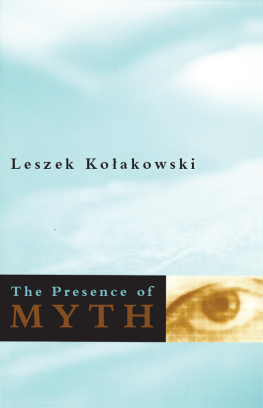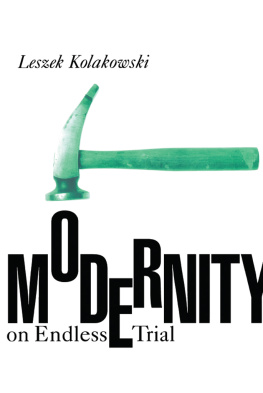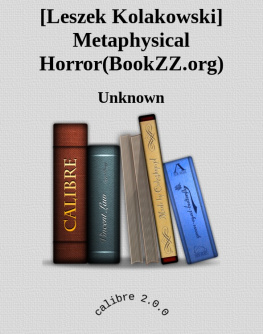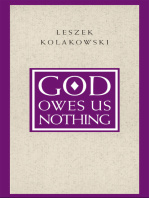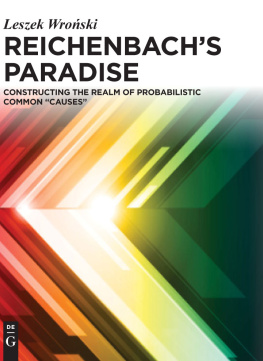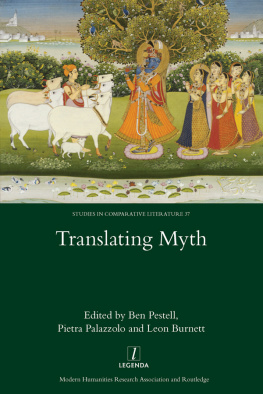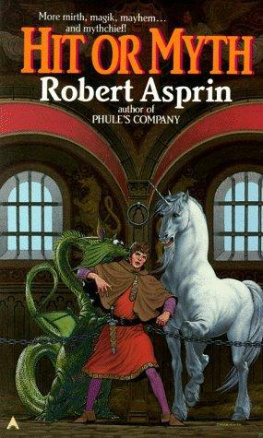Leszek Kolakowski - The Presence of Myth
Here you can read online Leszek Kolakowski - The Presence of Myth full text of the book (entire story) in english for free. Download pdf and epub, get meaning, cover and reviews about this ebook. year: 1989, publisher: University of Chicago Press, genre: Science. Description of the work, (preface) as well as reviews are available. Best literature library LitArk.com created for fans of good reading and offers a wide selection of genres:
Romance novel
Science fiction
Adventure
Detective
Science
History
Home and family
Prose
Art
Politics
Computer
Non-fiction
Religion
Business
Children
Humor
Choose a favorite category and find really read worthwhile books. Enjoy immersion in the world of imagination, feel the emotions of the characters or learn something new for yourself, make an fascinating discovery.
- Book:The Presence of Myth
- Author:
- Publisher:University of Chicago Press
- Genre:
- Year:1989
- Rating:4 / 5
- Favourites:Add to favourites
- Your mark:
- 80
- 1
- 2
- 3
- 4
- 5
The Presence of Myth: summary, description and annotation
We offer to read an annotation, description, summary or preface (depends on what the author of the book "The Presence of Myth" wrote himself). If you haven't found the necessary information about the book — write in the comments, we will try to find it.
The Presence of Myth — read online for free the complete book (whole text) full work
Below is the text of the book, divided by pages. System saving the place of the last page read, allows you to conveniently read the book "The Presence of Myth" online for free, without having to search again every time where you left off. Put a bookmark, and you can go to the page where you finished reading at any time.
Font size:
Interval:
Bookmark:
THE PRESENCE OF
MYTH
Leszek Kolakowski
Translated by Adam Czerniawski

The University of Chicago Press
CHICAGO AND LONDON
First published in France in 1972 as Obecno mitu (issue 224 in the Biblioteka Kultury) by the Institut Litteraire, Paris. 1972 by Leszek Kolakowski. A German translation was published in 1973: R. Piper & Co. Verlag, Mnchen 1973.
The University of Chicago Press, Chicago 60637
The University of Chicago Press, Ltd., London
1989 by The University of Chicago
All rights reserved. Published 1989
Paperback edition 2001
Printed in the United States of America
10 09 08 07 06 05 04 03 02 01 3 4 5 6 7
ISBN 978-0-226-22225-7 (ebook)
ISBN: 0-226-45041-4 (cloth)
ISBN: 0-226-45057-0 (paperback)
LIBRARY OF CONGRESS CATALOGING-IN-PUBLICATION DATA
Kolakowski, Leszek.
[Obecno mitu. English]
The presence of myth / Leszek Kolakowski: translated by Adam Czerniawski.
p. cm.
First published in France in 1972 as Obecno mitu (Issue 224 in the Biblioteka Kultury) by the Institut Litteraire, ParisT.p. verso.
Includes index.
ISBN 0-226-45041-4
1. Myth. 2. Culture. 3. Man. I. Title.
B4691.K586303413 1989
128dc19
8837054
CIP
 The paper used in this publication meets the minimum requirements of the American National Standard for Information SciencesPermanence of Paper for Printed Library Materials, ANSI Z39.48-1992.
The paper used in this publication meets the minimum requirements of the American National Standard for Information SciencesPermanence of Paper for Printed Library Materials, ANSI Z39.48-1992.
PREFACE TO THE ENGLISH EDITION
This is a very, very old book. It was written in Polish in 1966; but the censoring authorities, despite the lengthy efforts of the publishing house, forbade its publication in Poland. It was eventually published in Polish in France in 1972 by Institut Littraire, and in German translation by Piper Verlag. When I was reading it after so many years, it struck me how strongly my philosophical language was then dependent on German and French (mainly German) phenomenological and existential idiom, and to what extent this influence contributed to a stylistic heaviness which was probably avoidable. This was the reason why it could be translated relatively smoothly into German (according to my experience Polish and German are virtually the same language if we leave aside vocabulary, grammar, syntax, and phonetics); whereas to render it in English turned out to be an extremely arduous task in which, in spite of the hard and skillful work of my friend Adam Czerniawski, some clumsiness could not be avoided. If I had been compelled to write it in English, I would have probably expressed the same idea in another text. Too late.
Chicago, 20 July 1988
PREFACE
This little book is a concise summary of a nonexistent treatise, which its potential readers will in all probability be spared. I wanted it to be brief and, therefore, as far as possible, devoid of examples, historical anecdotes, footnotes, names, quotations, extensive classifications, digressions, reservations, and polemics. The price of the virtue of brevity are the vices of a certain dryness, monotony, and inadequate documentation. Nor is it a learned treatise (particularly in the realms of religious studies, mythography, sociology, or the psychology of myth), but an attempt to present a certain point of view with regard to a sensitive problem constantly present in the philosophy of culture. This problem concerns the localization in culture of mythopoeic production in relation to the structural characteristics of human consciousness.
The term myth, whose precise definition I do not attempt and whose meaning, so I assume, emerges from the discourse as a whole, requires a certain initial stipulation. Its range overlaps the range demarcated by the study of religion. It covers a groupessential, it is true, but numerically insignificantof religious myths, that is, the myths of Beginning. It also includes certain constructions, present (be they hidden or explicit) in our intellectual and affective life, namely, those which conditioned and mutable elements of experience allow us to bind teleologically by appeal to unconditioned realities (such as being, truth, and value). I attempt to justify this identification through a basic identity of functions which these various products of human spiritual life perform. I also attempt to explain how the inevitability of these functions in cultural life can be explained, and also in what sense they are not capable of coexistence with its technological and scientific efforts.
The mythological character of these derivative constructs constitutes the guiding notion of this discourse. Their parity with myth in the primary sense of the word comes about as a result of one particularly significant function. I do not therefore take into account those qualities of mythespecially their narrative qualitieswhich validate a search for their extensions in works of artistic imagination.
Such a generalized employment of a word which already has its rules of application more or less fixed may be open to criticism. But I could find no other which would better designate the realm I am concerned with. Relying on the authority of A. N. Whitehead, I may add that the whole of philosophical endeavor depends on attempts at constructing concepts which are more and more general, for whose designation the existing vocabulary is never sufficiently rich. If one prefers to avoid arbitrary coinage, one has therefore to make use of words which lie closest to the projected realm and to give them an extended meaning. In philosophical reflection inherited words usually appear incompetent through excessive usage, while rashly constructed neologisms quickly turn into insufferable oddities, as numerous examples demonstrate. It is therefore safer to try out the possibilities embedded in existing terminology, taking care not to be carried away without resistance by its inertia and maintaining an alertness to meanings which are smuggled even subconsciously into the classification of the world in colloquial speech. All attempts at exposing hidden implications of language may be useful.
I attempt to employ the generalized concept of myth as a net to catch a permanently constitutive element of culture, and thus to create a somewhat different principle of classifying phenomena than is most often accepted in the philosophy of culture. I am convinced that the crucial boundary between the mythological layer of culture and its technological and scientific layer runs differently from what might be judged on the basis of most generally known functional interpretations of mans mythological creativity. The differently is not, however, simply the outcome of a different meaning arbitrarily assigned to the term myth. On the contrary, that altered sense arises from the conviction that religious mythologies are a certain variant or a historical particularization of a phenomenon which may be grasped in a more fundamental characterization; and that the essential functional bond links these mythologies with products found in all human intercourse (and in our civilization as well); in intellectual activities, in artistic creativity, in language, in coexistence covered by moral values, in technological endeavors, and in sexual life. I am, therefore, attempting to trace the presence of myth in nonmythical areas of experience and thought. Thus, for example, I do not think one should draw on the opposition of the two heterogenous blocks, science and religion. And not only because religious phenomena function as tools in various spheres of communal life, but also because the basic validations of the scientific efforts make use of the labors of mythical consciousness. For similar reasons I attempt, as far as possible, to free myself from such oppositions as intellect/intuition, thought/emotion, and others.
Next pageFont size:
Interval:
Bookmark:
Similar books «The Presence of Myth»
Look at similar books to The Presence of Myth. We have selected literature similar in name and meaning in the hope of providing readers with more options to find new, interesting, not yet read works.
Discussion, reviews of the book The Presence of Myth and just readers' own opinions. Leave your comments, write what you think about the work, its meaning or the main characters. Specify what exactly you liked and what you didn't like, and why you think so.

